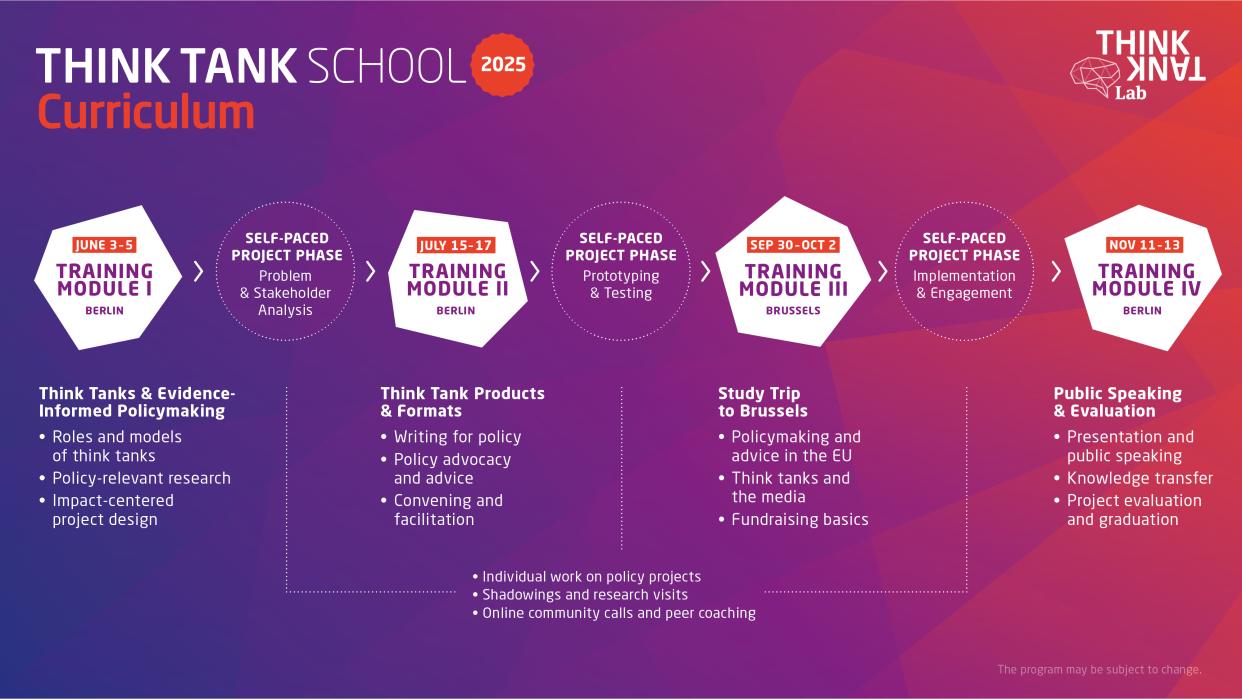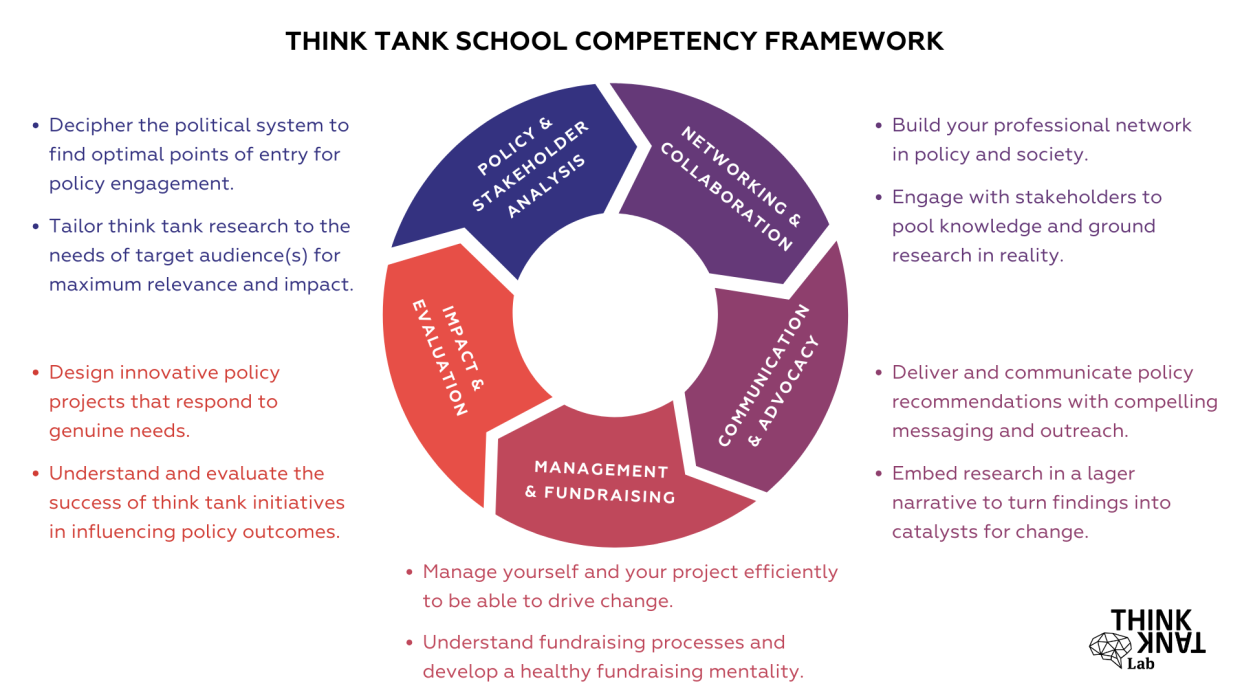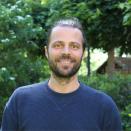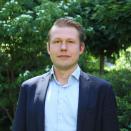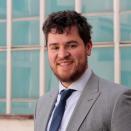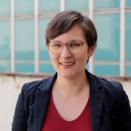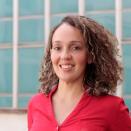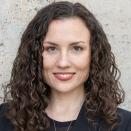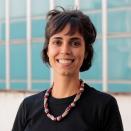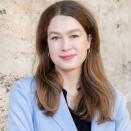Call for Applications Now Open
The Think Tank School is a unique training program for early-career professionals that is specifically tailored to the requirements and demands of the think tank sector.
The program offers fellows the opportunity to take the next step in their careers by developing their skills for effective think tank work, expanding their professional network in the policy and think tank community, and applying innovative methods to an individual research project of their choice.
Overview
Information Webinar
Program & Structure
Who Can Participate
Competency Framework & Learning Objectives
Why Participate
Tuition Fee
How To Apply
FAQ
Fellows
The Think Tank Lab created a rich program that showed us, fellows, in many different ways how to achieve more impact as think tanks and research institutes.
Ana Helena Palermo Kuss, ZEW – Leibniz Centre for European Economic Research
Information Webinar
For interested participants and organizations, an information webinar will take place on March, 26, 2025, from 12:00 – 01.00 PM (CET). To participate, please register here.
Program & Structure
The program combines different learning formats, prioritizing your professional growth while supporting knowledge transfer to your organization.
Training Dates
Module I – Think Tanks & Evidence-Informed Policymaking
June 3-5, at DGAP, Berlin
Module II – Think Tank Products & Formats
July 15-17, at MERICS, Berlin
Module III – Study Trip to Brussels
September 30-October 2, at EPC, Brussels
Module IV – Public Speaking & Evaluation
November 11-13, at DGAP, Berlin
- Training Modules
-
Build foundational skills and learn key tools and frameworks for innovative, impact-driven think tank work in interactive seminars led by experts and practioners in Berlin and Brussels. You are encouraged to translate these concepts directly into your own work environment.
- Policy Projects
-
Apply and test new tools and approaches to a policy problem of your choice, while developing an individual project step-by-step and benefiting from structured guidance. We recommend scheduling 1-4 hours per week for the individual project work.
- Online Community Calls
-
Stay connected between modules, present your project updates, and exchange insights during interactive online sessions.
- Shadowing & Research Visits
-
Gain firsthand insights into real policy processes, and inspiration by shadowing key stakeholders or relevant institutions, such as a ministry, parliamentary office, media outlet, or innovation studio.
- Peer Learning
-
Collaborate closely with fellow participants in structured peer coaching formats to refine your project, share best practices, and strengthen your problem-solving skills.
- Networking Activities
-
Expand your professional network with peers, policymakers, funders, and other stakeholders through social events.
Who Can Participate
The Think Tank School is open to think tank professionals who have:
- Research and analysis roles in a think tank or policy-oriented research institute based in Germany; and
- 1-6 years of professional experience in the sector or other relevant fields.
Career changers are also welcome to participate. There is no age restrictions for applicants. The program offers up to 18 spots per cohort.
We reserve the right to allocate a limited number of places to think tankers from European organizations. If this applies to you, please get in touch directly.
Competency Framework & Learning Objectives
The Think Tank School is based on a competency framework that was specifically developed to reflect the variety of skills required to excel as a think tanker in an ever-changing environment.
After completing the Think Tank School, you will be able to:
- Critically reflect and consciously shape your role in a dynamic policy environment;
- Design and implement policy-relevant and impactful projects;
- Convey complex ideas clearly to diverse audiences;
- Build and leverage networks with peers and stakeholders for common policy goals; and
- Translate new methods and insights back into your organization.
Why Participate
For fellows:
- Gain and apply new skills through hands-on training sessions and project work.
- Get expert guidance, develop innovative solutions, and expand your network with peers, policymakers, and think tank stakeholders.
- Join the Bosch Alumni Network and MercatorGlobe, global alumni communities fostering cross-sectoral exchange and collaboration.
For organizations:
- Strengthen staff capabilities with systematic training and empowerment.
- Gain insights into innovative approaches and build networks with other think tanks.
- Experiment with new project formats and ensure effective knowledge transfer back to your organization.
Tuition Fee
Participation in the Think Tank School is possible for a fee of EUR 1,175 (excl. statutory VAT).
The tuition fee covers all expert lectures, learning activities, networking events, and site visits; all learning materials; lunch and coffee breaks; a diploma upon completion; and access to the Think Tank Lab community and alumni networks.
The fee does not include travel and accommodation to Berlin and Brussels. Participants are responsible for arranging and covering these costs themselves.
We offer a limited number of partial scholarships for participants with financial need. However, we encourage you to explore funding solutions with your organization first. If you would like to be considered, please indicate this in your application and briefly describe your situation.
How To Apply
To apply for a spot in the Think Tank School 2025, please complete the ONLINE APPLICATION FORM and submit all supporting documentation.
The application deadline is April 23, 2025.
The participants of the 2025 cohort will be announced no later than May 8, 2025.
Application Documents
To apply, you must submit ALL of the following:
- Motivation Statement (two-minute video or 300 words): Explain why you want to participate, and how you will apply what you learn.
- Policy Problem (max. 300 words): Describe the issue you would like to work on during the program.
- Stakeholder Plan: Specify whom you want to interview or shadow, and why.
- Letter of Support: From your organization, confirming time for all trainings and project work, plus the support provided. You can find a template here.
- CV: Highlighting your professional experience in a think tank or research environment.
Selection Process
Participants will be selected on the basis of their experience and expertise, their chosen problem, and on how the Think Tank School will support them at this point in their career. The Think Tank Lab team will also take into consideration the background of other participants to ensure a diverse cohort.
FAQ
- Who can apply to the Think Tank School?
-
The program is designed for early-career professionals (around 1–5 years of experience) working in think tanks or policy-oriented research organizations, including NGOs. If your role involves research and analysis to inform policy, you’re encouraged to apply. We don’t have age limits, and career changers are also welcome to apply.
- Can I work in a think tank based outside Germany?
-
Yes. We reserve a limited number of spots for participants from European think tanks. If you’re based outside Germany but in Europe, please reach out to discuss eligibility before applying.
- Do I need a fully developed project idea before applying?
-
No. We only ask you to outline a policy problem or research question of interest. You’ll refine your project throughout the program with expert guidance and peer support.
- Does my policy problem have to relate directly to my day-to-day work? Are there any specific topics you are looking for?
-
Not necessarily. You can choose a project closely tied to your current role or an issue outside your usual responsibilities, as long as it’s feasible to develop within the program timeframe. We’re open to a wide range of policy areas—past participants have focused on everything from climate, peace and security to digital governance. Your proposed problem should be timely, relevant, and policy-focused.
- How much time should I expect to invest?
-
On average, you should plan for 1-4 hours per week for project work and peer learning calls, plus dedicated time for the in-person training modules in Berlin and Brussels. The workload can vary based on how closely your project relates to your regular job responsibilities.
- Is in-person participation mandatory, or can I follow a module remotely?
-
Our modules in Berlin and Brussels are designed for in-person participation to maximize networking and hands-on learning. Remote attendance is generally not provided.
I truly admired the scope and depth of this program, which was beyond my expectations. The quality of the program and the various networking opportunities make the Think Tank School a great investment for employers in their early career analysts.
Kaspar Pucek, Clingendael Institute
Fellows
- Fellows 2024
Policy Project: Tackling Forced Labor in Global Supply Chains Policy Project: Data- and Cybersecurity of Imported Smart Cars: How the EU should prepare for foreign connected vehicles Policy Project: Don’t Spread the Message – Developing approaches to counter disinformation among (older) adults Policy Project: Engaging civil society in Ukraine's EU accession negotiations Policy Project: Exploring the potential of futures-thinking in peace mediation Policy Project: The Populist Playbook – A Policy Database on Populist Leaders Policy Project: Navigating troubled waters: What future(s) for UN peace operations? Policy Project: Phasing into the freedom of movement in an enlarging European Union Policy Project: No One Left Behind: Including Vulnerable Groups in Kosovo's Energy Plans Policy Project: What next after the opening of accession negotiations? – Making Bosnia and Herzegovina fit for EU membership Policy Project: Rethink democracy support: Towards a policy of mutual learning Policy Project: C'est le Ton Qui Fait la Musique: Understanding Perceptions of France's Strategic Dialogue on Nuclear Deterrence Among European Allies Policy Project: Transforming Belarusian Agriculture: A Policy Proposal for Sustainable Development and Reform Policy Project: Rethinking the EU’s Belarus Policy: The Opportunities, Limits, and Tradeoffs of a Pragmatic Turn Policy Project: Towards a cohesion-sensitive green industrial policy for the EU Policy Project: How to get the implementation of the AI Act right? Policy Project: Germany’s New Alliances in Global Health Governance Policy Project: Beyond dependency: Identifying pitfalls and potentials in the EU’s approach to diversifying strategic raw material supplies - Fellows 2023
Policy Project: (Achieving) Strategic autonomy at sea: EU as a maritime security actor Policy Project: The (potential) Impact of the European Green Deal on German-Turkish Economic Relations Policy Project: Game of Tropes. Gender-Based Disinformation as a New Frontier for Foreign Influence Operations in Eastern Africa. Policy Project: How to improve gender diversity in policy making? Policy Project: Flipping the script on illiberal transformation: How local action and governance can work to defy anti-democratic measures of the state leadership Policy Project: Flip the Script: The EU’s Continuing Security Engagement in the Sahel Policy Project: Promoting Clean Energy in Central Asia: German Companies' Role and Best Practices Policy Project: Working with Civil Society Groups: How Should European Actors Respond to Anti-French Sentiment in the Sahel? Policy Project: Thinking Beyond Financial Pledges: How to Engage the Ukrainian Diaspora in European Efforts to Rebuild Ukraine" Policy Project: Governing the donor-recipient relations in Ukraine’s reconstruction agenda Policy Project: EU Security Dilemma: a peace actor who teaches to fight Policy Project: Preparedness of the EU regarding interference (especially disinformation) in light of the 2024 European elections - assessment of Chinese policy material on the issue and readiness/responses in the EU and member states Policy Project: Addressing the Russian-Iranian Dilemma in the Middle East Policy Project: Addressing exponential gaps: Improving organizational readiness to deliver sustainable solutions at scale. Policy Project: Make Amazon pay? How to tackle labor policy and the future of work in Germany. - Fellows 2022
Policy Project: Pointing at the man behind the curtain: How to design convincing disinformation detection? Policy Project: Registry of AI Systems Used by the German Public Sector Policy Project: Integrated and universal social protection programmes to balance the impacts of the transition towards carbon neutral economies Policy Project: EU Migration Policy-making in Crisis Mode: Has the EU Found its Blueprint for the Future? Policy Project: Electricity market design for a net-zero emissions electricity system Policy Project: Identifying leeway for Germany's role in humanitarian reform processes Policy Project: Cybersecurity as a challenge for outer space security Policy Project: How does the international context of growing polarisation and tendencies towards self-sufficiency force the EU to adapt through a rethinking of its industrial, trade and competition policy? Policy Project: Outlining a feminist digital policy: How can we make digital policy and tech regulation take societal risks into account and work in the public interest? Policy Project: Reconciling the German economic model with security concerns Policy Project: Mother Earth is sick of manels - The potential of Feminist Foreign Climate Policy and how it should be implemented by German foreign policy Policy Project: France’s role and agenda in Africa-EU relations Policy Project: The Future of the Internet: How might we need to adapt to a bifurcating cyberspace? Policy Project: The role of health in the energy transition Policy Project: Sustainable Tech: How might we make digital infrastructure (and AI as a new part of it) more sustainable? - Fellows 2021
-
Policy Project: Toward a New Storyline: Crafting a Transatlantic Narrative for Future Generations Policy Project: The Circular Chemical Economy as a Carbon Sink Policy Project: Digging for a Green Future: Securing Critical Raw Materials Supply Chains in the EU Policy Project: Acting Out: Germany’s Engagement in the Indo-Pacific Policy Project: Responding to China's (dis)information operations in Europe Policy Project: Nordic Approaches to Comprehensive Security and Resilience: Lessons for Germany Policy Project: How to strengthen trust in the expertise of think tanks in intercultural contexts: The example of Ukraine Policy Project: EU strategic autonomy in security and defense: towards a new transatlantic bargain? Policy Project: We are not ready yet: Europe from a German-Nordic-Baltic perspective Policy Project: Foreign Cultural Policy in Difficult Contexts. How Can and Should Foreign Cultural Policy Be Carried Out in Difficult Contexts? Policy Project: From Bibi to Bennett: Polarization of Israeli Society and Its Influence on Foreign Policy
